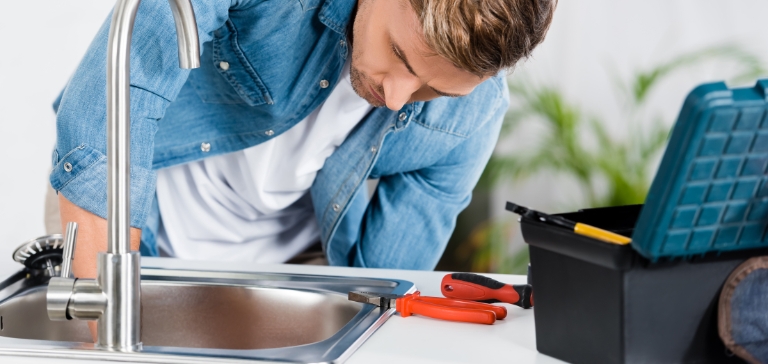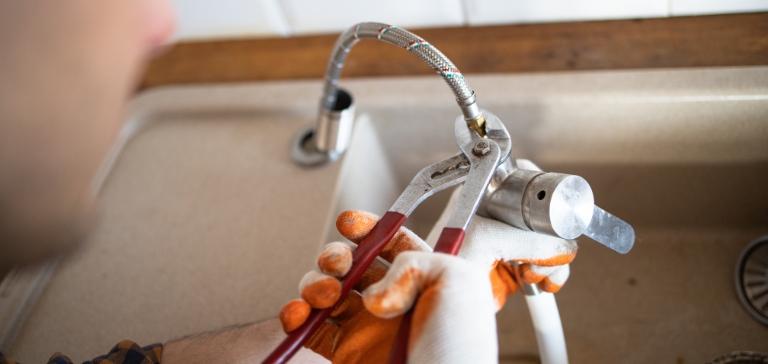Your kitchen sink is arguably the hardest-working fixture in your home. From washing dishes and prepping meals to handling everything from coffee grounds to soap residue, your kitchen sink plumbing system deals with a constant flow of water, food particles, and cleaning products.
A little preventive maintenance goes a long way in keeping your kitchen sink plumbing running smoothly and avoiding costly emergency repairs.
Daily Habits That Protect Your Kitchen Sink Plumbing

Mind What Goes Down the Drain
Grease and cooking oils are the biggest culprits in kitchen plumbing problems. When hot grease cools in your pipes, it hardens and creates stubborn blockages that can be costly to remove.
Instead of pouring grease down the drain, let it cool and solidify in a container, then throw it in the trash. Coffee grounds, rice, pasta, and fibrous vegetables like celery can also cause significant clogs over time.
Run Cold Water during Disposal Use
Kitchen sink plumbing typically includes a “garbage disposal.. Always run cold water before, during, and after using it. Cold water helps solidify any oil, making it easier for the disposal to chop it up and flush it through your plumbing system. Hot water, surprisingly, can make grease problems worse by liquefying fats that later solidify in your pipes.
Weekly Kitchen Sink Plumbing Maintenance Tasks
Clean Your Garbage Disposal Naturally
Once a week, freshen and clean your garbage disposal. With a simple, natural method. Drop a few ice cubes and a handful of coarse salt into the disposal, and then run it with cold water. The ice helps sharpen the blades while the salt provides abrasive cleaning action. Follow this with half a cup of baking soda and a cup of white vinegar; let it foam for a few minutes, then flush with hot water.
Check for Visible Leaks
Take a few minutes each week to inspect the visible parts of your kitchen sink plumbing. Look under the sink for any signs of water damage, moisture, or active leaks around the P-trap, shut-off valves, and supply lines. Early detection of leaks can save you hundreds of dollars in water damage repairs.
Monthly Deep Maintenance for Your Kitchen Plumbing

Flush Your Drains
Once a month, give your kitchen sink plumbing a thorough flush. Pour a pot of boiling water down the drain to help dissolve any grease buildup and wash away debris. For extra cleaning power, follow the hot water with a mixture of one cup of baking soda and one cup of white vinegar. Let it sit for 30 minutes, and then flush with another pot of boiling water.
Inspect and Clean the Aerator
Your faucet aerator can become clogged with mineral deposits over time, reducing water flow and pressure. Unscrew the aerator from the end of your faucet spout and soak it in white vinegar overnight. Use an old toothbrush to scrub away any remaining deposits before reattaching it.
Seasonal Kitchen Sink Plumbing Checkups
Professional Inspection Considerations
While homeowners can handle many aspects of kitchen sink plumbing maintenance, it’s recommended to have a professional plumber inspect your system annually. They can identify potential issues with water pressure, check for hidden leaks, and ensure all components are functioning optimally.
Winter Preparations
If you have exterior kitchen plumbing or live in an area prone to freezing, take steps to protect your pipes during winter months. Insulate exposed pipes and know the location of your main water shut-off valve in case of emergencies.
Red Flags: When to Call a Professional
Some kitchen sink plumbing issues require professional attention. Call a plumber immediately if you notice persistent bad smells coming from your drain, water backing up into your sink, significantly reduced water pressure, or any signs of water damage around your plumbing fixtures.
Keep Your Kitchen Flowing Smoothly
Maintaining your kitchen sink plumbing doesn’t have to be complicated or time-consuming. By incorporating these simple maintenance tasks into your routine, you’ll extend the life of your plumbing system, prevent costly repairs, and ensure your kitchen remains the heart of your home.
Remember, when it comes to kitchen sink plumbing, prevention is always better than cure. A few minutes of maintenance each week can save you thousands of dollars in repairs and keep your kitchen running smoothly for years to come. Start implementing these practices today, and your future self will thank you for the foresight.

